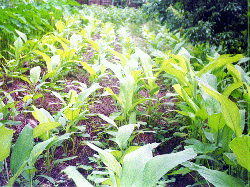Archives
Organic farming in Assam
Organic farming in Assam
 Ordeals and dilemmas dominate the life of Assam farmers. They have immense capacity to endure hardships – natural and man-made. Their farming wisdom remains unchallenged despite technological advancements. As a sequel to the realization for a sound environment and food for all of us, efforts are now being made to find ecologically sound, economically viable and technologically improved methods of agricultural farming. The demand of organic food is increasing in Assam as the consumers are becoming more conscious of food quality, health and environment.
Ordeals and dilemmas dominate the life of Assam farmers. They have immense capacity to endure hardships – natural and man-made. Their farming wisdom remains unchallenged despite technological advancements. As a sequel to the realization for a sound environment and food for all of us, efforts are now being made to find ecologically sound, economically viable and technologically improved methods of agricultural farming. The demand of organic food is increasing in Assam as the consumers are becoming more conscious of food quality, health and environment.
Organic agriculture in the process has come out to be the viable alternative to address the issues thrown up as the after effects of chemical rich agriculture practiced since 1960. There is a lot of debate between the proponents of organic farming and sections of the community who questioned the scientific validity and feasibility of organic farming particularly in developing countries – with opinions often polarizing between genetic engineering and organic agriculture based solutions. With organic products gaining popularity worldwide in the wake of humanity’s devastating experiences with chemical farming, Assam is readying itself for the next phase of the green revolution “organic farming”. The land of monsoons and evergreen forests is rediscovering its ancient farming practices along with many nations which are committed to socially responsible, ecologically friendly and economically self-sustainable development. Though Assam and the North East are mostly organic by default – according to government figures, of the net cultivated area of 4.3 million hectares, around 30.92 lakh hectares have never seen the use of chemical or inorganic fertilizers – conscious organic farming has suddenly picked up across Assam, especially among those cultivating ginger, turmeric, oranges, black pepper and pineapples. Farmers living in pockets of hilly tracks, untainted by pollutants and away from the hazards of modernity are now tapping into ancient secrets of sustainable farming. They are rediscovering the benefits of traditional and holistic farming that maintain soil health and biodiversity. Assam’s potential for organic farming is truly enormous. That Assam is “naturally organic by default” can be gauged from the extremely low consumption of fertilizer in the region. While the Indian average is currently around 106 kg of chemical fertilizer, Assam has been using 56 kg of chemical fertilizer per hectare on an average. Again, the state uses 40.46 grams of chemical pesticides per hectare against the all-India average of 0.448 kg. Farmers in these areas often use organic manure as a source of nutrients that are readily available either in their own farm or in their locality. With the sizable acreage under naturally organic/default organic cultivation, Assam has tremendous potential to grow crops organically and emerge as a main supplier of organic products in the world’s organic market. The need is for putting up a clear strategy on organic farming and its link with the markets. While the government still puts up a paltry amount of money in organic farming, intensive agriculture receives massive subsidies to pollute the environment. It is the author’s opinion that the solution has been with us for a long time– get back to farming, real farming – organic farming! We can live more healthily, enhance our environment, reinvigorate the countryside by increasing employment and produce the food we need, at better quality, by working with nature. If we simply like the idea of our children and grand children being able to visit the countryside and play in the forests and fields just like our ancestors did, we should go organic for the sake of all of our futures.
 Assam is embracing organic farming in a big way with the help of the central government. In a historic move, two companies, to promoteorganic cultivation in Assam’s hilly Karbi Anglong district have been launched recently. The main aim of the companies is to help tribal people belonging to the Karbi tribe realize better returns from their land. This initiative is designed to promote organic cultivation of turmeric, ginger and chilli in the district on a large-scale and also to promote processing and export. The State Agricultural Department initiated a pilot scheme jointly with the Government of India in 2004 for organic farming in the districts of Udalguri, Sonitpur and North Lakhimpur covering an area of 91 hectares and involving 154 farmers. This scheme led to the production of 133 MT of Joha rice in the year 2007 and last year it produced 60 MT of this aromatic variety of rice. The Geneva-based SGS India certified the products of the scheme and with the help of the Haryana based Sunstar Overseas Limited export process of this aromatic rice to Germany, Switzerland and the UK has started.
Assam is embracing organic farming in a big way with the help of the central government. In a historic move, two companies, to promoteorganic cultivation in Assam’s hilly Karbi Anglong district have been launched recently. The main aim of the companies is to help tribal people belonging to the Karbi tribe realize better returns from their land. This initiative is designed to promote organic cultivation of turmeric, ginger and chilli in the district on a large-scale and also to promote processing and export. The State Agricultural Department initiated a pilot scheme jointly with the Government of India in 2004 for organic farming in the districts of Udalguri, Sonitpur and North Lakhimpur covering an area of 91 hectares and involving 154 farmers. This scheme led to the production of 133 MT of Joha rice in the year 2007 and last year it produced 60 MT of this aromatic variety of rice. The Geneva-based SGS India certified the products of the scheme and with the help of the Haryana based Sunstar Overseas Limited export process of this aromatic rice to Germany, Switzerland and the UK has started.
No agriculture can continue to feed a growing population if it depletes or fouls up its resource base. The path undertaken by conventional agriculture is ultimately a dead end in this regard, though there is an almost mystical faith that genetic engineering and other complex technologies will always triumph. Agriculture needs to be sustainable. Unless, Assam makes a rapid shift towards organic farming, the cost in terms of environmental degradation and health costs arising from agriculture could rise sharply. Organic farming is therefore, a welcome alternative from three angles, i.e., saving in finance draining by small farmers, eco-friendly and helps in improvement of soil fertility and will facilitate the government on trimming gradually the subsidy on fertilizers. The environmental sustainable advances in the productivity and profitability of organic production system will help to generate both livelihood and income. Whatever be the reasons, it appears as a welcome step that would help benefit farmers by increasing their earnings from the same land holdings while cutting down on the cost of pesticides and chemicals. However there are a few hurdles that have to be surmounted. It is important for the government to first carry out a study to ensure how best farmers can make a transition from today’s farming practice to the organic mode because the shift would have to be carried out without any gap in farming activities. There is also a need for the government to identify which particular crops would be most suitable for which region of the state. Keeping in view the information needs of the farming community, the government must also train its personnel, without which the right knowledge would not be available to the needy. No less importantly, the government has to set up a mechanism to market the organic produce. It would be a dangerous proposition if the farmers, and especially the marginal farmers, find themselves without reliable channels to sell their produce with no government support by their side. Further the government could do well if certification and branding of produce could be done to identify them as genuine organic produce from Assam.
S. P. Saikia
Some facts and figures
- Net cultivated area :: 4.3 million hectares
- Cultivated land free of chemical fertilizers :: 30.92 lakh hectares
- Amount of chemical fertilizers per hectare in Assam :: 56 kilograms
- Amount of chemical fertilizers per hectare in India :: 106 kilograms
- Amount of chemical pesticides per hectare in Assam :: 40.46 grams
- All India average of chemical pesticide use :: 0.448 kilograms

